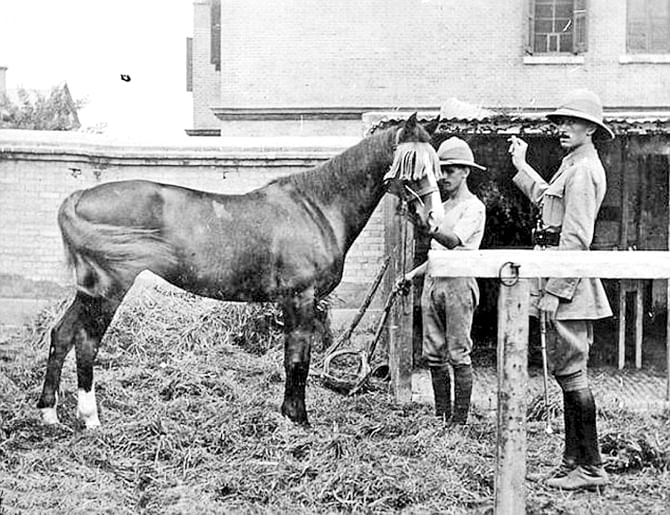Incredible story of The Sikh
Incredible story of The Sikh

The incredible story of a real-life 'War Horse' – nicknamed The Sikh – that dodged shellfire to deliver supplies to troops before walking back to the UK from Russia during the First World War has been uncovered for the first time.
After the war ended in 1918, the animal walked all the way back from southern Russia to Devon, England.
It echoes the plot of War Horse, the Michael Morpurgo novel adapted into an award-winning West End play and Steven Spielberg film.
The incredible story was unearthed by Chris Chatterton, the curator of the Soldiers of Gloucestershire Museum, last week.
He said: 'I was reading a book about The Glosters and I came across a mention of The Sikh. I did some more digging and it really is a remarkable story. She was viewed by many men in the Battalion as an Omen of good luck. A statue to honour The Sikh would be great. We will certainly be doing something at the museum to commemorate her.'
The Sikh arrived at the front line with her devoted master Lieutenant A C Vicary, of the Gloucestershire Regiment Vicary, and the regiment's Second Battalion in Ypres.
She was one of the million horses sent to the Western Front during the First World War.
She was lucky to survive the conflict as only 67,000 returned home, after 933,000 tragically died.
The brave horse was bred in Australia and sold to India. She arrived in North China with the 36th Sikh Regiment where passed into the ownership of Lt Vicary in 1913.
When the battalion was given orders to return to Europe for war in November 1914, Vicary obtained special permission to take The Sikh with him.
She was the only horse to accompany the Battalion from China, braving a treacherous eight-week boat journey from China to Europe.
The Sikh was a loyal companion to Vicary throughout the entire the First World War, supporting him and his troops in the reserve lines and support trenches.
The courageous pair led the 16th Gloucestershire Regiment in their victorious march through Serbia and Bulgaria.
The Sikh proceeded with the Regiment to South Russia, before following them home through Turkey, Greece, Italy and France once the war ended in 1918.
Vicary ended the war as a Lieutenant Colonel, having one a Military Cross and two Distinguished Service Orders medals for his gallantry.
After her illustrious and adventurous life as a war horse, The Sikh died in peaceful retirement at Vicary's home in Devon.
Museum curators have noted that spending the remainder of her life in Devon, was reminiscent of the hero in best-selling Morpurgo's book.